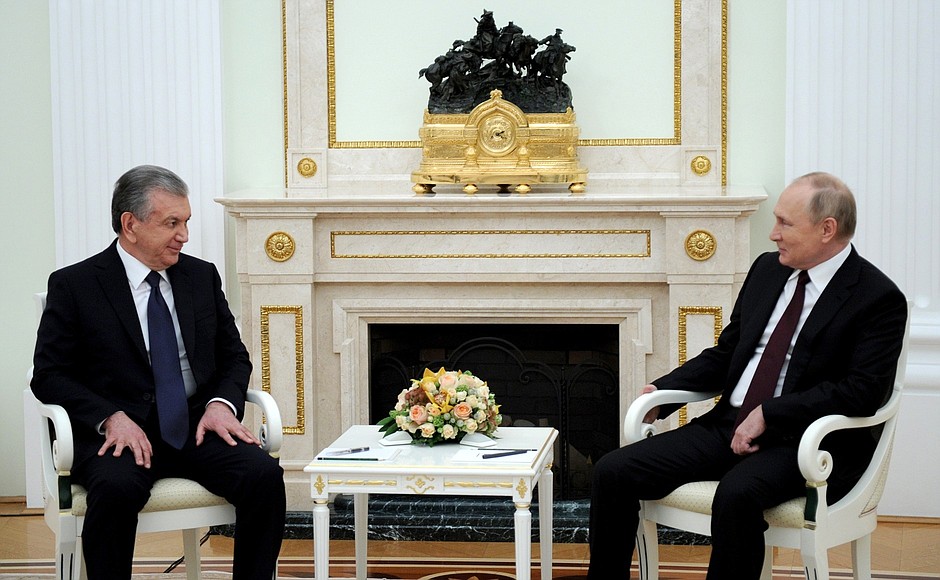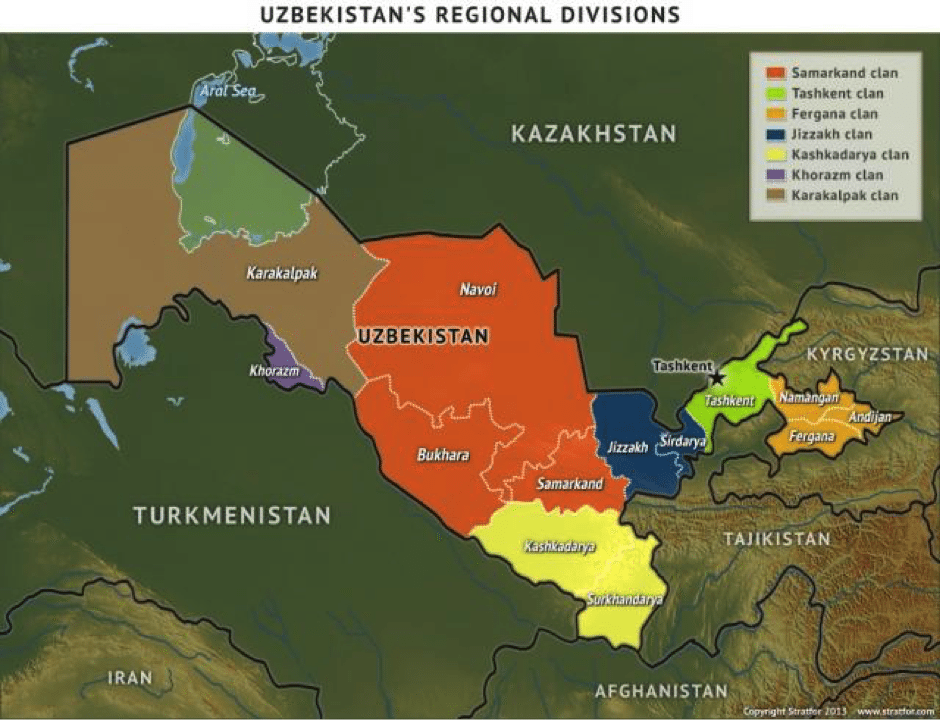 Uzbekistan President Shavkat Mirziyoyev (L) met Russian President Vladimir Putin (R), Moscow, November 19, 2021
Uzbekistan President Shavkat Mirziyoyev (L) met Russian President Vladimir Putin (R), Moscow, November 19, 2021
The visit of Uzbekistan President Shavkat Mirziyoyev to Moscow on November 19 at the invitation of President Vladimir Putin resulted in a joint statement on information technology and a slew of documents on trade and economic cooperation but its strategic significance cannot be lost on the regional capitals.
Putin’s talks with the visiting Uzbek leader soon after his re-election in the presidential election on October 24 significantly impact the situation in Afghanistan and regional politics.
Russia and Uzbekistan have turned a new page. The warmth at the personal level between the two leaders and the manifestly relaxed tone of their exchanges is a departure from the era of Mirziyoyev’s predecessor Islam Karimov.
Shavkat Mirziyoyev is an amiable personality and his four years in power greatly eased Uzbekistan’s tense relationships with its neighbours. Having been in politics since the 1980s and having held the levers of executive power as prime minister for the previous 13 years under Karimov’s stern eyes, Mirziyoyev is steeped in the art of the possible.
He came to power with a determination to reboot the Uzbek-Russian relations. The candour with which he has told Putin that the “the outcome of the presidential election in Uzbekistan was one of the positive results of our cooperation” must be taken at face value. In fact, Putin called Mirziyoyev and congratulated him full 2 hours before the election results were announced in Tashkent.
Mirziyoyev’s course correction has meant a willingness to integrate with Uzbekistan’s big neighbour. Karimov bristled at Moscow-led integration processes and suspected dubious intentions behind them, with a paranoid outlook.
Mirziyoyev’s consolidation of power, which is not easy in the steppes steeped in clan struggle, shows that he can be firm and far-sighted as a politician. The manner in which he eased out Rustam Inoyatov in 2018 (who belonged to the powerful Tashkent clan) from the position of security tsar and ‘kingmaker’, a position the grey cardinal held for 23 years, speaks for itself. (Mirziyoyev hails from the Jizzakh clan.)

Putin told Mirziyoyev at their meeting last week, “Uzbekistan is not only a close neighbour but also an ally, this is how we regard Uzbekistan. It is a major regional country, with which we have many links, both historically and in the current period.” In turn, Mirziyoyev acknowledged: “I believe we have things to discuss because now we have a completely different level of relations. We are intensifying our integration in all areas and it is intensive.”
It remains to be seen whether Mirziyoyev would strategically reorient Uzbekistan toward Russia by joining Moscow-led regional organisations the Collective Security Treaty Organization (CSTO) and the Eurasian Economic Union (EEU) — or simply settle for a pragmatic, constructive, mutually beneficial, accommodative relationship with Moscow.
The prospects are improving. Karimov was obsessed with Uzbekistan’s perceived destiny as regional hegemon and national security state. Whereas, Mirziyoyev has shifted the locus to the Central Asian collective and from economic autonomy to regional cooperation.
Alongside, Mirziyoyev has opened the economy to foreign investment. His reform of the Uzbek currency by eliminating the de facto dual exchange rate system opened the access to international capital markets and a series of Eurobond sales. Mirziyoyev is a technocrat by training, a graduate of the famous Soviet-era Tashkent Institute of Irrigation and Melioration, holding a Ph.D in Technological Sciences.
Putin of course has been quick to respond leading to a spike in bilateral trade and investment. The new dynamism in Russian-Uzbek economic relations has strengthened Mirziyoyev’s political base. In the first nine months of 2021, bilateral trade hit $6 billion. That surpasses the $5.6 billion for 2020. Agreements worth $9 billion with companies from Russia were signed on the sidelines of Mirziyoyev’s visit, including 141 investment projects worth $7.4 billion, and 455 export deals worth $1.6 billion.
Of course, it can only help that Alisher Usmanov, the Uzbek-born Russian oligarch billionaire — estimated $18 billion worth with vast investments in mining and metals industries, telecom and internet companies and sponsor of the famous football club Dynamo Moscow — is related by marriage to Mirziyoyev. As in any ancient society, family kinships lubricate political authority in that part of the world. Incidentally, Usmanov who owns Kommersant newspaper is known to be close to the Kremlin too.
The situation in Afghanistan would have a bearing on the trajectory of Russian-Uzbek security cooperation. Given the unceremonious withdrawal of the US troops from the region and the acute security threats emanating from Taliban-ruled Afghanistan, the Central Asian states have looked toward Moscow as provider of security. Thus, Uzbekistan’s non-aligned foreign policy notwithstanding, Tashkent no longer defines its strategic autonomy in autarchic terms, as in the Karimov era.
Among the Central Asian states, Uzbekistan is closest to Russia in its attitude toward the Taliban takeover in Afghanistan. The Uzbek officials are maintaining intense contacts with the new authorities in Kabul and inject momentum into economic cooperation. On Monday, Uzbekistan and Kazakhstan signed a defence agreement, putting behind their simmering rivalry as the foremost regional power.
Tashkent’s refusal to provide bases for the Pentagon to conduct “out-of-horizon” operations in Afghanistan reflects these broad tendencies in Uzbek regional strategies under Mirziyoyev. Tashkent is positioning itself to perform a pioneering role in constructively engaging the Taliban government in Kabul.
Evidently, this meshes with the Russian and Chinese thinking and dovetails into Pakistan’s drive to legitimise the Taliban government. Mirziyoyev and Pakistani prime minister Imran Khan have struck up a cordial relationship. In the process, Uzbekistan is fast emerging as the regional hub in connectivity once the railroad to Tashkent from China via Kyrgyzstan takes shape.
Putin has brilliantly handled the new thinking in Tashkent. Russia’s focus on adding content to the relationship, eschewing overbearing attitudes, recognising Uzbekistan’s legitimate interests — Uzbek migrant labour in Russia remitted home close to $700 million in the first quarter of this year alone — and fostering an equal relationship based on trust and mutual respect — such an approach is proving fruitful.
The comfort level has improved to a point that the Kremlin is in no hurry to push Uzbekistan to join the EEU as full member (rather than remain as “observer”) or to rejoin the CSTO (which Karimov had quit.) The two countries held their first joint drills in 2018 in over twelve years in Uzbekistan’s Jizzakh region.
In regional terms, the current trajectory of Russian-Uzbek ties will have a salutary calming effect on the intra-regional equations in Central Asia. The intra-regional politics has become discernibly more relaxed. From the Russian perspective, Uzbekistan under Mirziyoyev becomes a credible buffer vis-a-vis Afghanistan.
